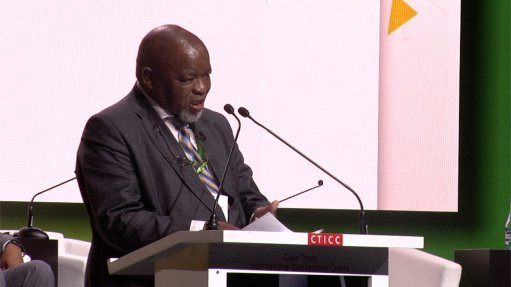
CAPE TOWN (miningweekly.com) – Mineral Resources Minister Gwede Mantashe has assured investors it is safe and stable to invest in the South African mining industry, with the return of regulatory certainty and a revised Mining Charter.
“There was a lot of policy and regulatory uncertainty for the better part of last year. We have addressed that. We have finalized the Charter. If you come to South Africa, you know what to expect,” he said in a keynote address at the opening of the Investing in African Mining Indaba in Cape Town.
He said the legislative framework was in line with expectations of investors.
“We want to assure investors it is safe to invest in South Africa,” Mantashe told thousands of delegates to the annual four-day event, which is celebrating its 25th anniversary.
The Minister, who took over the position from Mosebenzi Zwane last year after an uncertain few years, said it was important for investors to feel that the investment environment was "comfortable and attractive".
Mantashe said the government hoped to grow the mining sector’s share of the country’s gross domestic product (GDP) to 10% over the next few years, as well as to boost its foreign earnings. Mining currently makes up about seven percent of the country’s GDP and 40% of the country’s foreign earnings.
He expressed concern about the overall performance of the mining industry and decline in employment in the mining industry to 457 000 industry employees from 463 000 last year. “This doesn’t seem much but it is very significant in a country where unemployment is high.”
Mantashe said the government had been focusing sharply on mining licences in provinces.
“We want to ensure investors that we’ve been hard at work to ensure there is no double licencing, stealing of licences or corruption.” The department had also directed the Council for Geoscience to enhance geological mapping. It had also begun drilling in certain areas.
“The Council for Geoscience must be able to say ‘we have this quantity of coal or manganese here’ so that investors find it easier to invest, but investors have to partner with us.”
He said beneficiation and adding value to minerals was essential, so that the country did not simply depend on ‘pit to port’.
“We must export processed minerals rather than taking our bulk iron and shipping it away. That takes a number of jobs from South Africa to other places.”
He said national mineral research organisation, Mintek was also working hard to develop fuel cells.
“We are at a stage where we need to do mass commercialization of fuel cells, to adapt to challenges facing us in energy.”
Mantashe said illegal mining posed a major challenge. He said it was important to issue licences for small-scale mining and to make it part of the mining industry.
“We are new at this. We hope this Indaba will help us develop ideas.”
Commenting on unrest in mining communities, Mantashe said mining companies needed to co-exist with communities and avoid acrimonious relationships.
“’The time for just focusing on the shareholder is gone. Companies must be seen to be looking after their own workers and communities. Workers convert investment into wealth and they deserve respectable treatment by mining companies.”
He said it was necessary to change attitudes within mining communities.
“Mining must not only be seen from a negative point of view and as polluting the environment. It should be seen to be benefitting communities. People should take pride in having mines in their communities.”